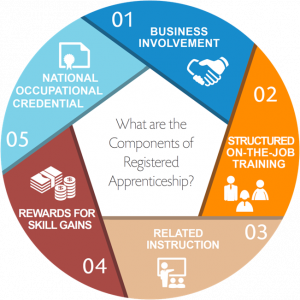Registered Apprenticeship history in MA in non-traditional trades.
Massachusetts has a rich history of successful registered apprenticeship programs (RAPs) in expansion industries within healthcare sector occupations. In recent years, with support from the Governor and the Massachusetts Executive Office of Labor and Development (EOLWD), and with assistance from DOL-funded apprenticeship grants, MassHire Hampden County Workforce Board (MHHCWB) has become actively and aggressively engaged in the national movement to expand registered apprenticeships in non-traditional trades. MHHCWB has been an established Registered Apprenticeship (RAP) Sponsor in the state of Massachusetts since 2017. MHHCWB is presently a Division Of Apprenticeship Standards (DAS) approved Sponsor and is managing the implementation of the Standards with multiple employers in manufacturing, healthcare and behavioral health industries.
What is a Registered Apprenticeship Program?
Registered Apprenticeship is an industry-driven, high-quality career pathway where employers can develop and prepare their future workforce, and individuals can obtain paid work experience, receive progressive wage increases, classroom instruction, and a portable, nationally-recognized credential. Registered Apprenticeships are industry-vetted and approved and validated by the U.S. Department of Labor or a State Apprenticeship Agency.
Registered Apprenticeship Programs (RAP’s) enable and energize more employers to participate and provide them access to larger talent pools that have been trained for entry-level to management positions, thereby meeting industry demands and reducing unemployment rates across the country.
5 Pillars of Registered Apprenticeships

- Employment: Each apprentice is an employee subject to employer policies, and procedures; continued employment is the end goal.
- Related Technical Instruction: Classroom/In-house/Online Training (Educational plan)
- Structured On the Job Learning: Applying classroom training skills and knowledge with a paired mentor.
- Competency & Wage Increase: As apprentices gain skill, wages increase
- Industry Recognized Credential: Apprentices who complete program requirements receive a certificate of completion and a industry recognized credential.

